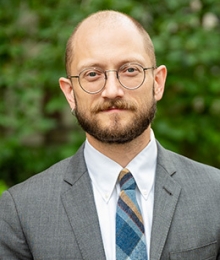Science, Health, and Information Clinic
Course Information
- Course Number
- L9235
- Curriculum Level
- Upperclass
- Areas of Study
- Administrative Law and Public Policy, Civil Procedure, Litigation, and Dispute Resolution, Commercial Law and Transactions, Health Care and the Law, Intellectual Property and Technology, Lawyering, Racial, Economic, and Social Justice
- Type
- Clinic
- Additional Attributes
- Experiential Credit
Section 001 Information
Instructor
 Christopher Morten
Associate Clinical Professor of Law
Christopher Morten
Associate Clinical Professor of Law
Section Description
The Science, Health, and Information Clinic seeks to serve the public interest by fighting for, and winning, more equitable access to scientific, technical, and medical knowledge and to the benefits that flow from that knowledge. The clinic strives to address legal needs unmet by public interest legal organizations and other law school clinics. Students, under faculty supervision, will provide pro bono legal services to activists and organizers, scientific and medical researchers, patient and consumer groups, nonprofit public interest legal organizations, and other clients. The clinic has ongoing attorney-client relationships with PrEP4All, T1International, Universities Allied for Essential Medicines, and other groups committed to ensuring equitable access to medicines and other health care. The clinic also has ongoing attorney-client relationships with the Electronic Frontier Foundation, Public Citizen, Public Interest Patent Law Institute, and other organizations that seek to protect individual privacy and expand public access to valuable information.
The Science, Health, and Information Clinic provides Columbia Law students with rich, hands-on lawyering experience. The clinic endeavors to nurture ethical, creative, and independent student attorneys prepared to practice in emerging areas of law, science, and technology, areas that are increasingly critical to our economy, our society, and our health. Students will meet with clinic director Chris Morten for 2-4 hours per week in seminar, 1-2 hours per week in team-by-team supervisory meetings, and additional one-on-one meetings as needed. Students will be graded as described in the syllabus. Enrollment will be conducted through the standard experiential learning application process.
In the clinic, student attorneys:
Own their projects and become their clients' primary points of contact.
Work directly with their clients to help them define and achieve their goals.
Learn to use a wide array of legal tools to meet their clients' legal needs. These include client counseling; research and advocacy to legislators, policymakers, and the broader public; litigation; amicus briefs; petitions and comments to administrative agencies; licenses and other contracts; and Freedom of Information Act requests.
Are immersed in the many doctrines of law that shape science, health, and information, including intellectual property law, data privacy law, administrative and regulatory law, health law, and freedom of information law.
Students in the clinic are typically placed on one client project. Student rank their client project preferences at the beginning of the semester and typically receive either their first or second choice project. In each semester, the clinic typically offers at least one litigation-focused project, at least one research-and-advocacy-focused project, and at least one administrative-law-focused project. Typically about half of the clinic's client projects are primarily focused on health and health justice; the other half do not focus directly on health and may instead concern governance of technology, individual privacy, or access to information more broadly.
The Science, Health, and Information Clinic is a 7-credit clinic. Students in the clinic must enroll in both the seminar component (Science, Health, and Information Clinic, 3 credits) and the client work ("fieldwork") component (Science, Health, and Information Clinic Fieldwork, 4 credits).
For more information, please see the clinic's website, https://www.law.columbia.edu/academics/experiential/clinics/science-health-and-information-clinic
- School Year & Semester
- Spring 2024
- Points
- 3
- Method of Evaluation
- Other
- J.D Writing Credit?
- Minor (upon consultation)
- Writing Credit Note
- JD Minor Credit available upon consultation with instructor.
Learning Outcomes
- Primary
-
- At the end of the course, students will have acquired understanding of and/or facility in doctrinal analysis, including close reading of cases and precedents, and application to facts
- At the end of the course, students will have acquired understanding of and/or facility in statutory and regulatory analysis, including close reading of statutes and regulations, and application to facts
- At the end of the course, students will have acquired understanding of and/or facility in ethical and professional issues
- At the end of the course, students will have acquired understanding of and/or facility in the influences of political institutions in law
- At the end of the course, students will have acquired understanding of and/or facility in various lawyering skills, for example, oral advocacy, legal writing and drafting, legal research, negotiation, and client communication
Course Limitations
- Instructor Pre-requisites
- None
- Instructor Co-Requisites
- None
- Requires Permission
- Yes
- Recommended Courses
- None
- Other Limitations
- Admission to the course requires instructor permission. Students should apply through the standard experiential learning application process. There are no prerequisites or corequisites.
